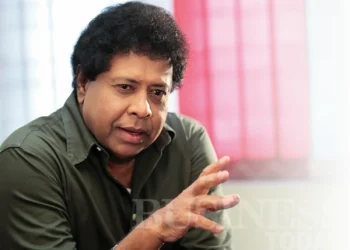
Professor Sunil Chandrasiri, Dean – Faculty of Graduate Studies, University of Colombo, reveals the story behind the innovation between Mobitel and the University of Colombo.
mLearning is an innovative teaching and learning process conducted through the use of mobile phones, Personal Digital Assistants (PDA’s), laptops and tablet PCs. It supports creation, brokerage, delivery and tracking of learning and information content using ambient intelligence, location-dependence, personalization, multimedia, and distributed databases. More specifically mLearning is an intersection of mobile computing and E-learning. It facilitates effective learning and performance-based assessment while offering more facilities to promote student centred learning by the application of ICT, in addition to providing location and time specific convenience to target beneficiaries, he shared.
This is a joint initiative of Mobitel and University of Colombo respectively. The first programme offered through mLearning was an Executive Diploma in Marketing and subsequently four others-Executive Diploma in Public Administration and Governance, Postgraduate Diploma in Business Management, Postgraduate Diploma in Public Administration/Management, and Masters in Public Administration/Management – were included. In the delivery of these programmes Sri Lanka Mobitel facilitates the learning environment through their internet platform and provides a bundle of facilities; storage of lecture notes, teacher-student interaction, discussions among student groups and submission of assignments. He added that Mobitel promotes mLearning programmes among target beneficiaries through their SMS customer base and published media.
Professor Sunil Chandrasiri also said that mLearning is considered as a feasible strategy to enhance access to higher education and also to catch up with mobile and emerging technologies in education. Enhancing access to higher education is heavily debated in Sri Lanka and application of mLearning has become a satisfactory solution since it is not constrained by distance, geographic barriers, physical infrastructure and busy schedules. In the case of FGS in particular, mLearning is an important strategy to enhance access to higher education as it recognises work experience and career development aspirations of target beneficiaries. More specifically, individuals with sufficient work experience are eligible to enroll in programmes offered at Executive Diploma and Postgraduate Diploma level offered by the Faculty of Graduate Studies of the University of Colombo.
Catching up with ICT applications in higher education is equally important in the context of Sri Lanka given its high achievements in the field of education, the overall growth performance of the national economy and its long-term development potential, he said. The response from the FGS towards such development initiatives was the introduction of the mLearning delivery mode for the benefit of thousands of individuals interested in university education and career development through work experience plus postgraduate qualifications.
He went on to say that the awareness of m-Learning has increased significantly over the past six years and as a result the faculty has been able to expand its mLearning programme into new areas such as Business Management, Public Administration and Governance, and Public Management. The positive response towards mLearning among students is reflected in the high enrolment and knowledge sharing on problems encountered during the course of study. Similar changes could also be noticed among academicians, as many teachers now prefer to use the mLearning mode as opposed to conventional modes. On having realised the positive benefits of mLearning, university administration has encouraged other faculties to reach different target beneficiaries through the mLearning mode. The quality of mLearning courses is equal to that of those offered in the conventional mode and carries an equal amount of credit hours. All programmes are structured in line with the quality assurance framework approved by the UGC and the government.
Mobile and emerging technologies will allow access to information and learning materials for everyone, regardless of time or place. The technology will exist everywhere, giving learners seamless access to learning materials. Education in the present time is moving away from learning in a classroom at a specific time to learning anywhere and at any time. Learning will be learner-centred, not teacher-centred. Materials will be available in electronic repositories, which will allow learners to access them at any time and from anywhere. He concluded by stating that learning technology is evolving rapidly.





